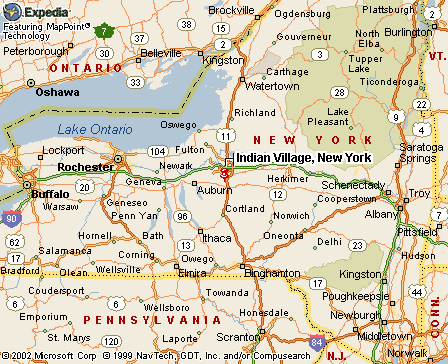|
|
Canku Ota |
|
|
(Many Paths) |
||
|
An Online Newsletter Celebrating Native America |
||
|
October 19, 2002 - Issue 72 |
||
|
|
||
|
Iroquois Nations Cup 2002 |
||
|
by Robert Taylor Indian
Country Today
|
||
|
credits: Tadadaho
Sid Hill, Onondaga, left, presents the Iroquois Nations Cup to Cam Bomberry
of Frog Pond Maulers I, a box lacrosse team from Six Nations Reserve,
Ontario. Bob Tarbell, Onondaga, right, looks on. Photo by: Robert J.
Taylor
|
 ONONDAGA
NATION, N.Y. -- Lacrosse has been played in some form for generations
in Indian country and the game’s originators, the Haudenosaunee,
remain passionate about the sport. ONONDAGA
NATION, N.Y. -- Lacrosse has been played in some form for generations
in Indian country and the game’s originators, the Haudenosaunee,
remain passionate about the sport.
Teams representing Haudenosaunee communities in New York and Ontario gathered recently for the 2002 Iroquois Nations Cup at the Onondaga Nation Arena, located on Nation land south of Syracuse, N.Y. The annual tournament, held from Sept. 19 through Sept. 22, was about more than trophies and prize money; it provided the scattered Haudenosaunee communities an opportunity to come together, preserve a vital aspect of their culture, pay respects to their Elders, and honor the Creator. "Today, the Nations Cup is more than a Lacrosse event, it is cultural gathering and a reconnecting of proud nations who have strived to maintain the game of lacrosse as the national game of the Iroquois Nation," said Michael Kanentakeron Mitchell, the First Nations Director and representative to the Canadian Lacrosse Association, in a written report submitted at the tournament. This year’s tournament featured some of the best box lacrosse to be played anywhere. The four-day competition, featured eight teams from several Haudenosaunee communities, including Onondaga, Kawenoke, Six Nations of the Grand, Cattarauggus, Newtown, Akwesasne (last year’s defending champions) and Tonawanda, competing in a two-division, round robin format. The championship game was an all-Six Nations affair, matching the Frog Pond Maulers I against the Frog Pond Maulers II. The teams advanced to the championships after playing five games in four days, including two on the final day of the tournament. All games were played at the Nation’s beautiful Tsha’Hon’nonyen’dakhwa’ Arena. Which was built in 2001.
|
|
|
||
|
|
||
| Canku Ota is a free Newsletter celebrating Native America, its traditions and accomplishments . We do not provide subscriber or visitor names to anyone. Some articles presented in Canku Ota may contain copyright material. We have received appropriate permissions for republishing any articles. Material appearing here is distributed without profit or monetary gain to those who have expressed an interest. This is in accordance with Title 17 U.S.C. section 107. | ||
|
Canku Ota is a copyright © 2000, 2001, 2002 of Vicki Lockard and Paul Barry. |
||
 |
 |
|
|
The "Canku Ota - A Newsletter Celebrating Native America" web site and its design is the |
||
|
Copyright © 1999, 2000, 2001, 2002 of Paul C. Barry. |
||
|
All Rights Reserved. |
||
